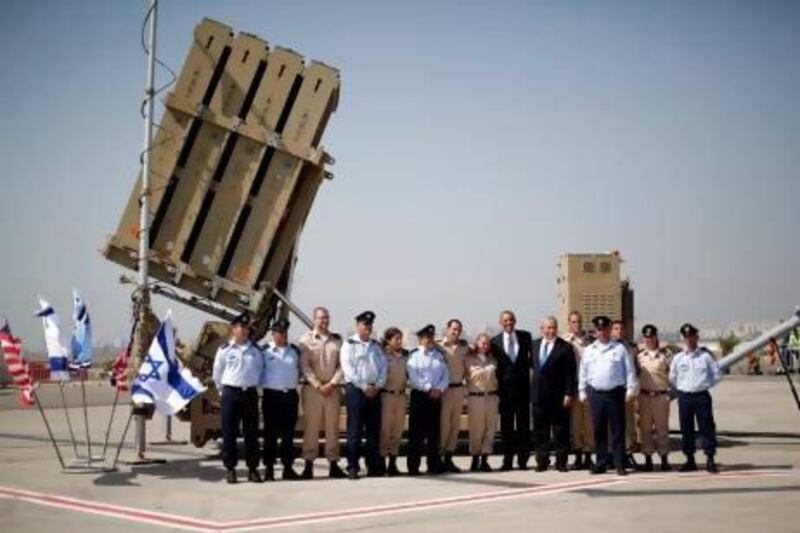TEL AVIV // For Israel, the Iron Dome rocket interceptor was the star of the country's eight-day hostilities with the Gaza-based Hamas last November, credited with saving lives by blasting hundreds of the Islamist group's rockets out of the sky.
Indeed, during Barack Obama's first visit to Israel last week as US president, his first stop was at a battery of the US-funded anti-missile system designed to destroy warheads of short-range rockets and artillery shells fired mainly from Gaza.
Yet, there has been growing criticism from US and Israeli security experts and scientists about Israel's claim that it shot down more than 80 per cent of about 500 Hamas rockets that targeted populated areas during last the fighting last autumn. Five Israeli civilians and one soldier were killed by the rocket fire.
Their conclusions, based on dozens of video clips shot by news organisations or amateurs and posted on YouTube, estimated the interception rate at no more than 10 per cent, while one scientist claimed the system was a complete failure.
If confirmed, the findings could jeopardise Israel's security if its army depends on Iron Dome to protect civilians against potentially more rocket fire from Gaza or from Lebanon's Hizbollah group in the next round of hostilities, said Reuven Pedatzur, a former Israeli fighter pilot and a military analyst who is an outspoken critic of Iron Dome.
Mr Pedatzur said developing Iron Dome in the first place was a "mistake" - strategically and cost-wise - and that the material cost of one Iron Dome missile was at least US$50,000 (Dh183,00) to intercept an enemy rocket estimated to cost only several hundred dollars.
"There are many question marks about Iron Dome now. The system may be good psychologically because it makes Israelis feel safer. But it makes no difference in saving lives. Five civilians were killed in last year's war with Gaza - a similar number as were killed in the fighting three years ago, when we didn't have Iron Dome."
He was referring to the three-week Israeli assault on Gaza in December 2008 to January 2009, when four Israelis died by rocket fire.
Much of the doubt about Iron Dome has been raised by Theodore Postol, a professor of science, technology and international security at the Massachusetts Institute of Technology. In 1991, during the First Gulf War, Mr Postol became known for debunking US army claims that its Patriot missiles succeeded in shooting down Iraqi Scud missiles.
According to Mr Postol, there were "relatively few" videos showing an Iron Dome missile intercepting an enemy rocket head-on - a position in which the missile has the best chance of destroying the rocket's warhead. He said that most of the footage showed Iron Dome missiles diving after the enemy rocket or approaching it from the side.
Mr Postol has also indicated the Israeli army may have under-reported the number of rockets - 58 - that got past Iron Dome. He cites a report by Israeli police saying it had investigated 109 incidents involving damage from rocket fire. The finance ministry in December reported 3,165 damage claims from rockets.
"Even recognising that rocket impacts could result in multiple damage claims, it's hard to see how 58 falling rockets armed with 20-kilogram warheads could possibly do the level of damage reported by the finance ministry," Mr Postol said.
Israel's defence ministry said that it "strongly rejects" the findings by Mr Postol. The ministry criticised the conclusions as being based on "amateur YouTube videos" and considered "by very few as scientific in nature". It added that Israel would continue acquiring more Iron Dome batteries.
Israel began developing Iron Dome after its 34-day war with Lebanon's Hizbollah group in 2006, when about 4,000 cross-border rockets killed 44 Israeli civilians. Iron Dome batteries have a radar sensor that decides within seconds of launch which rockets are targeting populated areas. The Iron Dome system then fires a missile, known as the Tamir, towards the most threatening enemy rockets.
The Iron Dome, which targets short-range rockets and projectiles, is part of Israel's three-tier missile shield. It also includes the US-backed David's Sling, which is still being developed and targets mid-range rockets, and the Arrow III system, which aims at the type of ballistic missiles held by Iran.
There are five Iron Dome batteries in Israel, most in the south near Gaza, and Israel is planning to deploy at least five more in the coming years. The US last year budgeted an add US$680 million through 2015 in aid to Israel to advance Iron Dome, adding to the $205 million it had approved in 2011 for the system. Israel funded Iron Dome initially, developing it through state-owned company Rafael Advanced Defence Systems, and US and Israeli officials have said they are mulling co-production as experts say the US may want to use the system to protect areas in combat zones such as in Afghanistan.
Mr Postol said that it was possible Israel had been carrying out a "deception" about Iron Dome's performance during the war with Hamas as an excuse not to invade the territory, fearing more deaths in a ground operation.
That concern is echoed by Mordechai Shefer, who worked for 26 years as a senior rocket scientist at the state-owned Rafael Advanced Defence Systems, Iron Dome's manufacturer, and who is trying to raise money for an independent missile-defence system.
Mr Shefer, who estimated that the system had a zero-intercept rate during the conflict, in January demanded in a letter to Benjamin Netanyahu, the Israeli prime minister, that an official inquiry be initiated into Iron Dome's performance. He said the Mr Netanyahu's office had not yet responded.
"Israel is totally exposed to missile threats today. Any rocket fire on our power stations and oil refineries will leave us without power, gas or water. Our enemies can finish us up within a few days," he said.
[ foreign.desk@thenational.ae ]
twitter: For breaking news from the Gulf, the Middle East and around the globe follow The National World. Follow us





